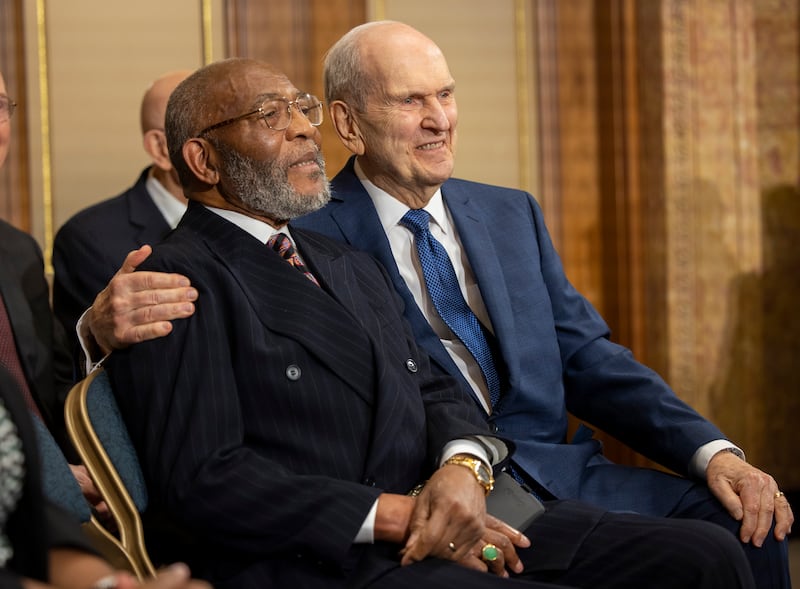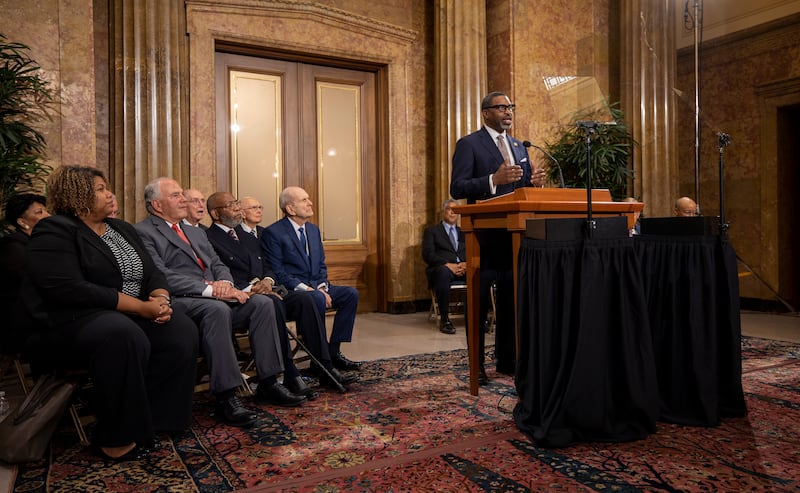Opinion polls show the United States continues to be divided by race, and that neither Black nor white Americans see the situation as good. A recent Gallup Poll found that only 46% of white respondents and 36% of Blacks said relations between the two were either good or very good.
Worse, attitudes about Black-white relations have deteriorated significantly since 2013, when the figures were 72% and 66%, respectively. So consider what occurred Monday in Salt Lake City, where The Church of Jesus Christ of Latter-day Saints furthered its relationship with the NAACP and newly with the United Negro College Fund by promising millions of dollars in scholarships for students and toward humanitarian projects.
The positivity emanating from that action brought this reaction from the Rev. Amos C. Brown, the NAACP’s emeritus director of religious affairs:
“Our democratic republic is under siege, but this very partnership of the NAACP and The Church of Jesus Christ of Latter-day Saints will be the saving factor to redeem the soul of the United States of America, so that we shall indeed become one nation, under God, indivisible with liberty and justice for all,” he said.

Unequal opportunities come as a natural outgrowth of racism, and this has long been an impediment to Black Americans. A recent Harvard Gazette report found that a typical Black family has about one-tenth the wealth of a typical white family.
The natural pathway out of this situation is two-fold: A change in attitudes, and an increase in exceptional educational opportunities for Black students.
“Last year’s protests after the death of George Floyd highlighted the despair many Americans felt over inequities. These initiatives are a promise of better days ahead.” — Deseret News Editorial Board
That makes the agreement announced Monday between the church (which owns the Deseret News), the NAACP and the UNCF a shining light in a racial landscape that seems to have darkened in recent years. Last year’s protests after the death of George Floyd highlighted the despair many Americans felt over inequities. These initiatives are a promise of better days ahead.
Church President Russell M. Nelson announced three new initiatives with the NAACP. A total of 174 Black students will be eligible for $3 million in scholarships funded by the church over three years, $6 million will be available for humanitarian aid to inner cities in the United States, and up to 50 students will receive a fellowship in the name of the Rev. Amos Brown, allowing them to travel to Ghana to learn about Black American and African history.
The Rev. Brown, the emeritus director of religious affairs for the NAACP, has become close friends with President Nelson and other church leaders. The announcement was the latest in a three-year relationship between the church and the NAACP.
As for a change in attitudes, that ultimately rests with the hearts and minds of conscientious Americans, but both President Nelson and leaders of the NAACP have repeatedly pleaded with people to be kinder and more compassionate.
“We call for greater civility and kindness,” President Nelson said Monday. “And we work together to bless the lives of God’s children. I have spoken repeatedly on these objectives and do so again today. I renew our call to abandon prejudice and promote civility, kindness and mutual respect. We seek to build bridges of cooperation instead of walls of segregation.”
This announcement came just ahead of the annual Juneteenth commemoration of the end of slavery. That was no coincidence, as President Nelson noted. He emphasized the organizations’ shared belief in “the fatherhood of god and the brotherhood of man.”
Education and humanitarian aid are good ways to begin the process of change. As economist Claudia Goldin, the Henry Lee professor of economics, told the Harvard Gazette, “You could wipe out a large fraction of inequality by ramping up the education of individuals who are limited in their ability to access and finish a college education.”
The growing relationship between these two venerable institutions promises to bring about such a result not just for a growing number of disadvantaged and deserving people, but for all of us who can learn from this example of love, cooperation and work for a common good.

